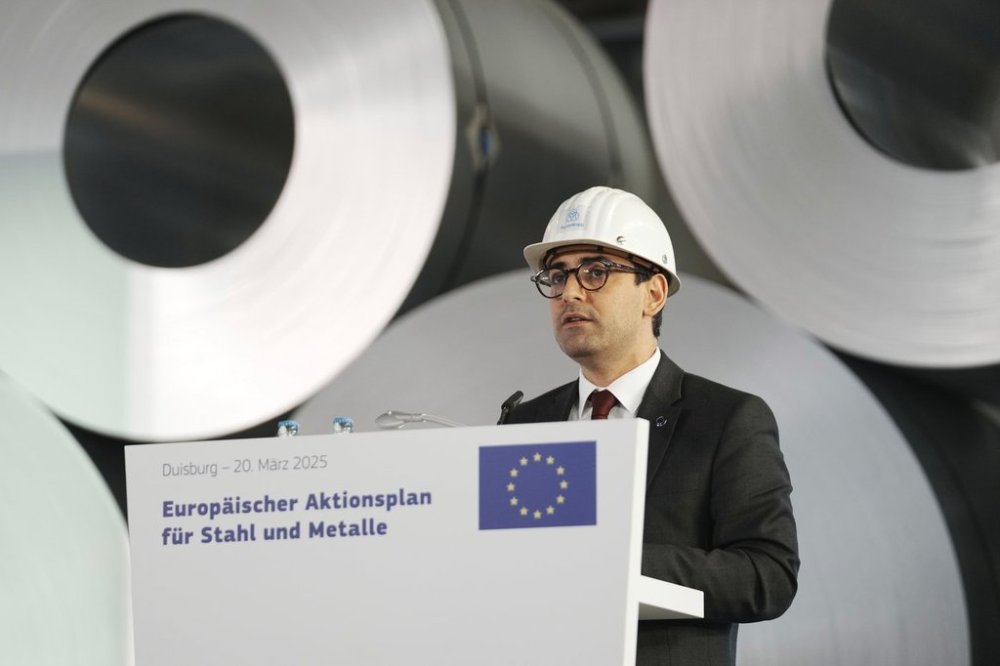Europe races to secure critical minerals as global supply tensions mount
Advertisement
Read this article for free:
or
Already have an account? Log in here »
To continue reading, please subscribe:
Monthly Digital Subscription
$0 for the first 4 weeks*
- Enjoy unlimited reading on winnipegfreepress.com
- Read the E-Edition, our digital replica newspaper
- Access News Break, our award-winning app
- Play interactive puzzles
*No charge for 4 weeks then price increases to the regular rate of $19.95 plus GST every four weeks. Offer available to new and qualified returning subscribers only. Cancel any time.
Monthly Digital Subscription
$4.99/week*
- Enjoy unlimited reading on winnipegfreepress.com
- Read the E-Edition, our digital replica newspaper
- Access News Break, our award-winning app
- Play interactive puzzles
*Billed as $19.95 plus GST every four weeks. Cancel any time.
To continue reading, please subscribe:
Add Free Press access to your Brandon Sun subscription for only an additional
$1 for the first 4 weeks*
*Your next subscription payment will increase by $1.00 and you will be charged $16.99 plus GST for four weeks. After four weeks, your payment will increase to $23.99 plus GST every four weeks.
Read unlimited articles for free today:
or
Already have an account? Log in here »
Hey there, time traveller!
This article was published 27/03/2025 (292 days ago), so information in it may no longer be current.
ATHENS, Greece (AP) — A top European Union official visited a strategic metals site in central Greece on Thursday, after the bloc announced plans to accelerate production of its own critical minerals and reduce dependence on China.
Stéphane Séjourné, an executive vice president at the European Commission, toured an aluminum plant that will soon extract gallium — a silvery, melt-in-your-hand metal used in advanced semiconductors, 5G antennas, solar panels and military radar systems.
The Greek venture is one of dozens of projects announced by Séjourné this week, aimed at boosting the 27-nation bloc’s self-sufficiency in key minerals as demand for high-tech materials surges and geopolitical tensions rise.

“This site is one of the 47 strategic projects selected to increase our production of critical raw materials and reduce our dependence on third countries,” Séjourné wrote in an online post after the tour in Greece.
European officials say global supply-chain vulnerabilities have been exposed by the COVID-19 pandemic, the war in Ukraine, and more recently by trade disputes — including export controls imposed by China last year on high-tech materials.
Greece’s gallium project — the only one of its kind on the list — will tap into domestic bauxite sources and integrate extraction with the country’s existing aluminum infrastructure.
Once operational, the plant, operated by Greece’s Metlen Energy & Metals company, is expected to produce up to 50 metric tons annually starting in 2027 — enough to meet most of Europe’s projected demand, according to EU and Greek officials.
“This is a significant investment of strategic importance — directly linked to the autonomy and security of both Greece and the entire European continent,” Development Minister Takis Theodorikakos said.
EU funds will be part of a 22.5 billion euro ($24.2 billion) investment into mining and processing schemes for 17 minerals listed as critical across 13 EU member states.
The minerals are vital ingredients in sophisticated products, including electric vehicles, battery parts, lightweight alloys for transport, and medical devices.
At a presentation of the projects in Brussels earlier this week, Séjourné said he hoped to build public support for domestic mining.
“I need to say this clearly: We do not want to replace our dependency on fossil fuels with a dependency on critical raw materials,” he said. “Chinese lithium must not become the Russian gas of tomorrow.”
The EU countries hosting the strategic projects are Belgium, Czech Republic, Estonia, Finland, France, Germany, Greece, Italy, Poland, Portugal, Romania, Spain, and Sweden. The materials covered include aluminum, boron, cobalt, copper, gallium, germanium, graphite, lithium, magnesium, manganese, nickel, platinum group metals, rare earth elements, and tungsten. ___ Cook reported from Brussels.

